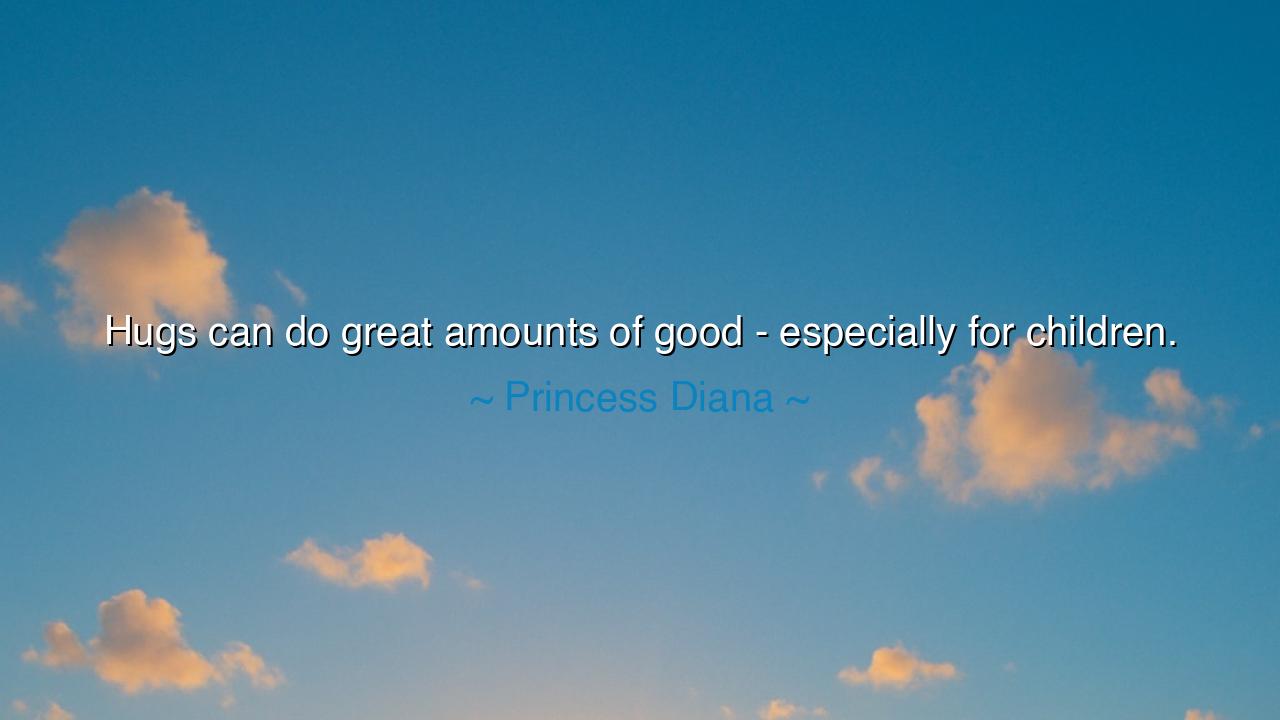
Hugs can do great amounts of good - especially for children.






Hear, O children of compassion and heirs of tenderness, the words of Princess Diana, who said: “Hugs can do great amounts of good—especially for children.” These words, though gentle as a whisper, carry the power of a commandment; for they reveal that in the smallest acts of love lie the greatest healings of the soul. Diana, called the Princess of Hearts, spoke not as a monarch, but as a mother to the world—a woman who understood that true greatness is not measured in crowns or decrees, but in the warmth we offer to another being.
In these words, she teaches that a hug—simple, wordless, unadorned—is not merely a gesture, but a form of communion. When arms encircle another in kindness, they speak a language older than speech, known even to the infant in the cradle. A hug says, “You are safe.” It says, “You are loved.” It bridges the invisible gaps between souls, reminding us that compassion is not an idea, but an action—a sacred energy transferred through touch. For children, whose hearts are still unshielded and whose spirits are still tender, such contact is the foundation of trust and joy. It teaches them that the world, though vast and uncertain, can also be gentle.
Princess Diana’s life was a testament to this truth. She walked among the sick, the orphaned, and the abandoned, and where others feared to touch, she reached out. The world remembers that day when she embraced a child dying of AIDS, shattering fear with love. In that moment, she became not merely a royal figure, but a symbol of human grace. Through each embrace, she restored dignity to the suffering and reminded the world that the smallest act of affection can pierce the walls of prejudice and despair. Her hug was not the softness of sentiment—it was an act of moral courage.
The ancients, too, understood the power of touch. In the temples of healing in Greece, physicians of Asclepius laid hands upon the wounded to draw forth vitality. In the scriptures of many faiths, prophets healed through the touch of compassion. Thus, the hug is no modern act—it is a continuation of humanity’s oldest medicine. It binds together the physical and the spiritual, the giver and the receiver, the powerful and the powerless. In the embrace, there are no kings, no beggars—only souls recognizing each other.
Let us recall also the story of Mother Teresa, who, like Diana, walked among the forgotten. She, too, understood that the first need of the human heart is not wealth or comfort, but connection. Her hugs to the dying and the poor were acts of restoration—proof that love need not solve every problem to be holy. To hold another being, to acknowledge their worth through presence and touch, is to declare that their life matters. This is the wisdom both women shared: that compassion requires contact, and love, to be real, must draw near.
Diana’s words also remind us of what the world risks losing in its haste and fear. We have built cities of isolation and called them modern. We have made machines that speak, yet forgotten how to hold one another. The Princess’s wisdom is a call to return—to simplicity, to humanity, to the quiet power of the embrace. Especially for the young, whose hearts form the shape of the world to come, affection is not luxury; it is necessity.
The lesson, therefore, is both ancient and immediate: never withhold warmth. When words fail, let kindness speak through your arms. Hug your children, your friends, your elders. Hug those who weep, and even those who resist it—for sometimes the hug is not for the body, but for the spirit. In this small act lies the greatest revolution, the quietest miracle, the surest bridge between hearts.
Thus, the teaching of Princess Diana endures beyond her years: that compassion need not be grand to be powerful. A hug is a seed of peace planted in the human heart. And if the world would give more of these small gifts—unasked, unearned, and freely given—then perhaps, at last, it might grow again into the garden of tenderness that it was always meant to be.






AAdministratorAdministrator
Welcome, honored guests. Please leave a comment, we will respond soon